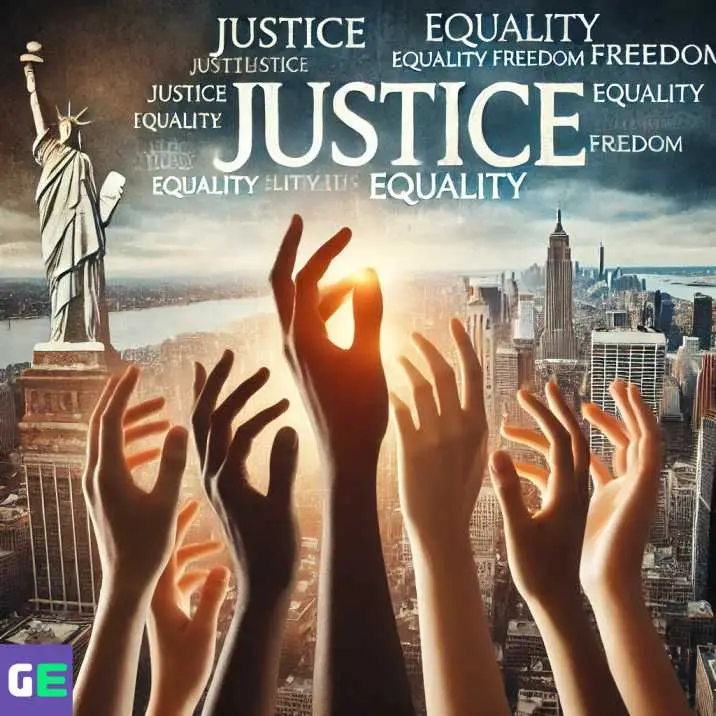Introduction
The United States has long grappled with various Social Justice Equality Issues, many of which continue to shape the nation’s political, social, and economic landscape. From racial discrimination to economic inequality, these issues impact millions of Americans, often disproportionately affecting marginalized communities. Addressing these concerns is essential for building a fairer society where everyone, regardless of race, gender, sexuality, or socioeconomic status, has equal opportunities.
The rise of social movements, increased public awareness, and policy reforms have highlighted the urgency of tackling Social Justice Equality Issues. Activists, lawmakers, and citizens alike continue to push for systemic changes to ensure justice and fairness for all. This article explores the top 10 Social Justice Equality Issues affecting the U.S. today and discusses their implications, causes, and potential solutions.
1. Racial Inequality and Systemic Racism
One of the most persistent Social Justice Equality Issues in the U.S. is racial inequality. Systemic racism is deeply rooted in American history and continues to manifest in various sectors, including education, employment, healthcare, and criminal justice.
Black and Hispanic communities, in particular, face significant disparities in wealth, job opportunities, and legal protections. Studies show that Black Americans are disproportionately affected by police brutality and mass incarceration, often receiving harsher sentences compared to white counterparts for similar crimes. The 2020 resurgence of the Black Lives Matter movement brought renewed attention to racial injustice, leading to calls for police reform and policies to dismantle systemic discrimination.
Efforts to combat racial inequality include advocating for fair policing practices, investing in minority-owned businesses, and ensuring equitable education opportunities for students of color. However, achieving racial justice remains a long-term battle that requires sustained policy changes and social commitment.
2. Gender Equality and Women’s Rights
Gender equality is another major Social Justice Equality Issue in the U.S. Women continue to face discrimination in workplaces, politics, and personal life. One of the most discussed aspects of gender inequality is the gender pay gap, where women, particularly women of color, earn significantly less than their male counterparts for the same work.
Reproductive rights are also a contentious issue, with debates surrounding access to abortion, birth control, and maternity leave policies. The overturning of Roe v. Wade in 2022 sparked nationwide protests, as many states imposed restrictive laws on reproductive healthcare.
Efforts to promote gender equality include enforcing stronger anti-discrimination laws, ensuring better workplace protections, and expanding access to healthcare. The #MeToo movement has also played a vital role in raising awareness about sexual harassment and assault, pushing for more accountability in workplaces and public institutions.
3. LGBTQ+ Rights and Discrimination
Despite progress in LGBTQ+ rights, discrimination remains a significant Social Justice Equality Issue in the U.S. Many LGBTQ+ individuals still face challenges related to employment, healthcare, housing, and legal protections.
Transgender rights, in particular, have been under attack, with laws restricting gender-affirming healthcare and bans on transgender participation in sports. Hate crimes against LGBTQ+ individuals remain a serious issue, with reports showing a rise in violence targeting this community.
Organizations and activists continue to fight for federal protections against discrimination, advocating for policies such as the Equality Act, which would provide nationwide legal safeguards for LGBTQ+ individuals. Social acceptance has increased, but legal and societal barriers persist.
4. Economic Inequality and the Wealth Gap
Economic inequality is one of the biggest Social Justice Equality Issues in the U.S., as the wealth gap between the rich and poor continues to widen. The top 1% of earners control a significant portion of the nation’s wealth, while millions struggle with low wages, job insecurity, and lack of benefits.
Workers in low-income jobs often face poor working conditions, lack access to healthcare, and struggle with financial instability. The minimum wage debate remains central, with activists pushing for a living wage that reflects the rising cost of living.
Addressing economic inequality requires comprehensive policies, including tax reforms, better access to education and job training programs, and stronger labor protections. Without systemic change, the gap between the wealthy and the working class will continue to grow, deepening social and economic disparities.
5. Criminal Justice Reform
The U.S. has the highest incarceration rate in the world, and mass incarceration is a major Social Justice Equality Issue. The prison system disproportionately impacts Black and Latino communities, with harsh sentencing laws leading to long-term social and economic consequences.
Mandatory minimum sentences, cash bail systems, and private prisons contribute to an unjust system that punishes the poor and minorities more harshly. Calls for criminal justice reform have led to initiatives such as eliminating cash bail, reducing sentencing for non-violent offenses, and expanding rehabilitation programs.
Police reform is also a significant topic, with demands for greater accountability, body cameras, and demilitarization of law enforcement agencies. While progress has been made in some states, comprehensive national reform is still needed.
6. Healthcare Inequality and Access to Medical Services
Healthcare disparities remain a pressing Social Justice Equality Issue in the U.S. Many low-income families and marginalized communities struggle to afford healthcare, leading to worse health outcomes and preventable deaths.
The high cost of prescription drugs, lack of insurance coverage, and unequal access to medical facilities disproportionately affect people of color and rural populations. The COVID-19 pandemic highlighted these disparities, as Black and Hispanic communities faced higher mortality rates due to lack of access to quality healthcare.
Expanding Medicaid, lowering drug prices, and ensuring affordable healthcare for all are essential steps toward addressing this issue. Universal healthcare remains a contentious topic, but policies aimed at closing healthcare gaps can significantly improve public health outcomes.
7. Immigration and Refugee Rights
Immigration policies and refugee rights continue to be among the most debated Social Justice Equality Issues in the U.S. Undocumented immigrants often face exploitation, legal uncertainty, and family separation due to harsh immigration laws.
The Deferred Action for Childhood Arrivals (DACA) program has provided temporary relief for many young immigrants, but its future remains uncertain. Border policies and detention centers have drawn criticism for inhumane conditions and violations of human rights.
Comprehensive immigration reform is necessary to create a fair and humane system that provides pathways to citizenship, protects refugees, and ensures legal protections for undocumented workers.
8. Disability Rights and Accessibility
People with disabilities continue to face discrimination and accessibility barriers, making this a significant Social Justice Equality Issue. Many workplaces do not provide adequate accommodations, and public spaces still lack proper accessibility features.
The Americans with Disabilities Act (ADA) has helped improve rights for disabled individuals, but enforcement remains inconsistent. Issues such as inaccessible transportation, healthcare discrimination, and lack of inclusive education still persist.
Stronger enforcement of disability rights laws, inclusive policies, and better public awareness can help create a more accessible society for all.
9. Education Inequality and Student Debt Crisis
Education is a key factor in social mobility, but inequality in the U.S. education system continues to be a major Social Justice Equality Issue. Schools in low-income areas receive less funding, leading to disparities in resources, teacher quality, and student outcomes.
Additionally, the student loan crisis has burdened millions of young Americans with debt, making higher education less accessible for lower-income students. Policies aimed at reducing tuition costs, expanding student loan forgiveness programs, and increasing funding for public schools can help address this inequality.
10. Climate Justice and Environmental Racism
Climate change disproportionately affects marginalized communities, making environmental justice a critical Social Justice Equality Issue. Low-income neighborhoods often suffer from pollution, lack of green spaces, and higher exposure to hazardous waste.
Efforts to combat environmental racism include advocating for clean energy policies, holding corporations accountable for pollution, and ensuring that all communities have access to clean water and air. Addressing climate change requires a social justice approach that prioritizes vulnerable populations.
Conclusion
The fight for social justice in the U.S. is ongoing, with many Social Justice Equality Issues requiring urgent attention. From racial and gender equality to economic and healthcare justice, addressing these challenges is crucial for a fairer and more inclusive society Read more
FAQs
1. What Are Social Justice Equality Issues, and Why Are They Important?
Social Justice Equality Issues refer to systemic disparities that affect marginalized communities in areas such as race, gender, income, education, healthcare, and civil rights. These issues stem from historical inequalities and continue to impact millions of people in the U.S.
Addressing Social Justice Equality Issues is crucial because they hinder equal opportunities and perpetuate discrimination. A just society ensures that all individuals, regardless of their background, have access to the same rights and resources. By tackling these issues, the U.S. can create a fairer, more inclusive environment where everyone has the chance to succeed.
2. How Does Racial Discrimination Contribute to Social Justice Equality Issues in the U.S.?
Racial discrimination is one of the most significant Social Justice Equality Issues in the U.S., affecting various aspects of life, including education, employment, housing, and criminal justice. Systemic racism has led to racial disparities in income levels, incarceration rates, healthcare access, and overall quality of life.
For example, Black and Hispanic communities are disproportionately affected by mass incarceration and police violence. Studies show that these groups often receive harsher sentences compared to white individuals for similar crimes. In education, schools in predominantly Black and Latino neighborhoods frequently receive less funding, resulting in lower-quality education and fewer opportunities for advancement.
Efforts to address racial discrimination include police reform, educational equity programs, and policies that promote diversity and inclusion in workplaces. Eliminating racial inequality requires long-term commitment from both government and society.
3. What Role Does Gender Inequality Play in Social Justice Equality Issues?
Gender inequality remains a critical Social Justice Equality Issue, affecting women and non-binary individuals in areas such as wages, leadership opportunities, healthcare access, and workplace discrimination.
The gender pay gap is a persistent issue, with women earning approximately 82 cents for every dollar earned by men. Women of color face even greater disparities. In addition, gender-based violence, reproductive rights restrictions, and underrepresentation in politics and corporate leadership continue to hinder gender equality.
The push for stronger workplace protections, equal pay legislation, and reproductive healthcare rights is essential to overcoming gender inequality. Movements like #MeToo have raised awareness about sexual harassment and workplace discrimination, prompting legislative and social changes.
4. How Does Economic Inequality Affect Social Justice Equality Issues?
Economic inequality is at the heart of many Social Justice Equality Issues, as income disparities limit access to education, healthcare, and stable employment. The wealth gap between the rich and poor in the U.S. continues to widen, with the top 1% holding a disproportionate amount of wealth.
Low-income families struggle with financial instability, lack of healthcare access, and limited opportunities for upward mobility. Many Americans work full-time yet remain below the poverty line due to stagnant wages and rising living costs.
Addressing economic inequality requires policy changes such as increasing the minimum wage, improving access to affordable education, and expanding healthcare coverage. These measures can help create a more equitable society where financial security is not a privilege but a right.
5. How Does the Criminal Justice System Contribute to Social Justice Equality Issues?
The U.S. criminal justice system has long been criticized for perpetuating Social Justice Equality Issues, particularly through mass incarceration and racial profiling. The country has one of the highest incarceration rates in the world, with Black and Latino individuals disproportionately affected.
Harsh sentencing laws, such as mandatory minimum sentences and the three-strikes rule, have contributed to overpopulation in prisons. Additionally, cash bail systems unfairly punish low-income individuals who cannot afford bail, leading to prolonged pretrial detention.
Criminal justice reform is essential to addressing these disparities. Measures such as eliminating cash bail, reducing mandatory minimum sentences, and increasing rehabilitation programs can create a more just system that focuses on rehabilitation rather than punishment.
6. What Are the Biggest Challenges Facing LGBTQ+ Rights in the U.S. Today?
While progress has been made in LGBTQ+ rights, many Social Justice Equality Issues still impact this community, including discrimination in employment, healthcare, and housing. Despite the legalization of same-sex marriage, LGBTQ+ individuals continue to face legal and social barriers.
Transgender rights, in particular, are under attack, with some states passing laws that restrict gender-affirming care and trans participation in sports. Hate crimes against LGBTQ+ individuals have also been on the rise.
Advocates continue to push for stronger federal protections, such as passing the Equality Act, which would provide legal safeguards against discrimination. Ensuring equal rights for LGBTQ+ individuals is essential to achieving true social justice.
7. How Do Education Inequalities Contribute to Social Justice Equality Issues?
Education inequality remains a significant Social Justice Equality Issue, as access to quality education is often determined by socioeconomic status and race. Schools in low-income areas receive less funding, leading to fewer resources, larger class sizes, and lower student performance.
The student loan crisis also disproportionately affects marginalized communities, making higher education less accessible. Many students graduate with significant debt, limiting their ability to build financial stability.
Addressing education disparities requires increased funding for public schools, affordable higher education options, and programs that support underprivileged students. Education is a key driver of economic mobility, and equal access to quality schooling is essential for social justice.
8. How Do Immigration Policies Relate to Social Justice Equality Issues?
Immigration is a major Social Justice Equality Issue, as many undocumented immigrants and asylum seekers face legal uncertainty, family separation, and workplace exploitation. Policies that restrict immigration rights disproportionately impact marginalized communities, leading to increased discrimination and hardship.
The Deferred Action for Childhood Arrivals (DACA) program has provided relief for some undocumented youth, but its future remains uncertain. Border detention centers have also faced criticism for inhumane conditions and mistreatment of detainees.
Comprehensive immigration reform is necessary to provide a fair pathway to citizenship and protect the rights of immigrants. Ensuring humane treatment and legal protection for all individuals, regardless of immigration status, is vital for a just society.
9. How Does Climate Change Relate to Social Justice Equality Issues?
Climate change is increasingly recognized as a Social Justice Equality Issue, as its effects disproportionately impact low-income communities and people of color. Environmental racism refers to the fact that marginalized communities are more likely to live near pollution sources, leading to health problems such as asthma and water contamination.
Extreme weather events, such as hurricanes and wildfires, often leave low-income families struggling to recover due to lack of resources and insurance. Policies addressing climate change must prioritize environmental justice by protecting vulnerable communities from the worst effects of global warming.
10. What Can Individuals Do to Help Address Social Justice Equality Issues?
Individuals play a crucial role in addressing Social Justice Equality Issues through activism, education, and policy advocacy. Supporting organizations that fight for civil rights, voting in elections, and engaging in community initiatives can help drive change.
Raising awareness through social media, attending protests, and donating to social justice causes are also effective ways to contribute. Additionally, educating oneself on systemic inequalities and advocating for inclusive policies can help create a more just society.
Real change requires collective action, and every individual effort contributes to the larger fight for equality and justice in the U.S.













Leave a Reply